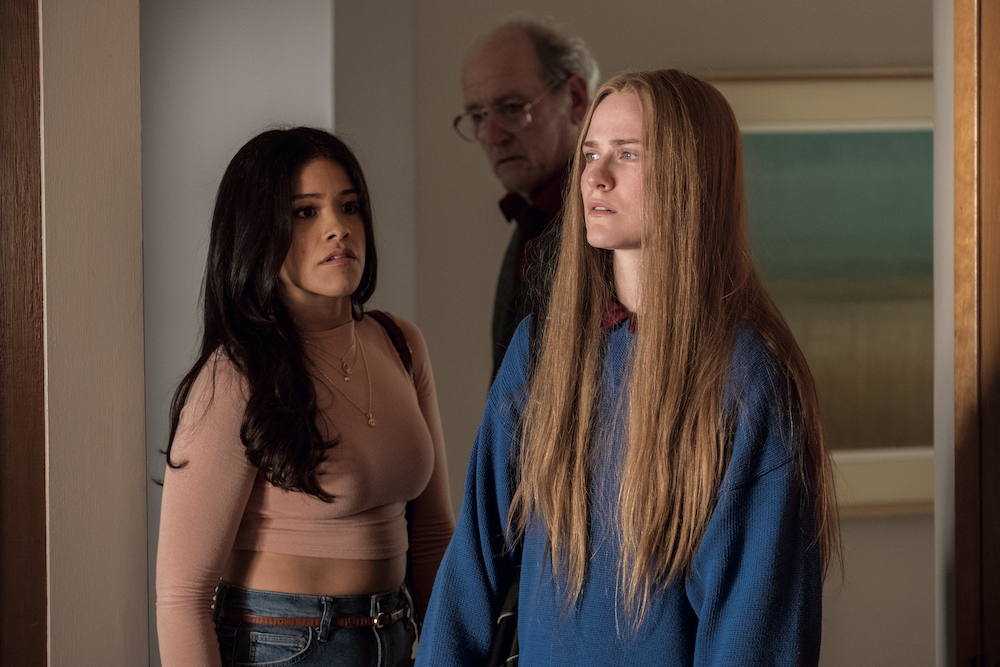Old Dolio, the oddly named central character played, wonderfully, by Evan Rachel Wood in Miranda July’s third feature film, learned to forge signatures before she could write. “In fact that’s how she learned to write,” says her father Robert (the great Richard Jenkins) proudly.
She and her parents – Debra Winger, long-haired, gaunt and limping, is Theresa, the mother – are small-time scam artists, without any outside influences or friends. They live, off-the-grid style, in a disused office in LA, sleeping among the cubicles. The office is next to a pink bubble factory, which leaks, so twice a day, three times on Wednesdays, they have to dash back to catch the bubbles in buckets and empty them down the drain.
They’re months behind with the rent on this inconvenient establishment, and contort themselves – Theresa and Richard hunched over, Old Dolio, in her baggy tracksuit, bent backwards like a limbo dancer – when trying to hide from their strangely over-emotional landlord. “We may have to pay in instalments,” explains Richard. “Rent is an instalment, a monthly instalment,” sobs the landlord.
Whether you’re charmed or annoyed, even baffled, by this dark, surreally funny and sometimes infuriating film depends on your tolerance for July’s brand of off-beat weirdness, familiar from her more indie, less star-studded movies, in which she starred: Me and You and Everyone We Know (2005) and The Future (2011), as well as her art, performance art and fiction.
Some of the themes of Kajillionaire are present in her hilarious, wildly brilliant debut novel The First Bad Man (2015): the rigidity of the solitary heroine, the malfunctioning relationships, the obsession with domestic systems, the loneliness of Los Angeles, the intervention from a sexy outsider who's part of modern culture. And you do feel sometimes that the Dynes might spring into life more effectively, psychologically speaking, on the page – they might even be funnier – as so much about them is unexplained, including the fact that Old Dolio, aged 26, still buys into her parents’ lunacy without question. Has she never been to school? Wanted to meet other people? But logic doesn’t apply in this restricted, cult-like universe – and every family is its own cult, as July says – where “tender feelings” such as sadness or love are belittled.
The Dynes steal from post-office boxes and, undeterred, come away with useless loot such as a nice tie or a gift certificate for a massage. Old Dolio, who was named after a homeless guy who won the lottery (her parents were hoping he’d put her in his will, but no) tries to get a refund for the massage, or at least something in part exchange – a crystal, a shelving unit – from the practitioner’s room. But in the end she has to go ahead with the massage, submitting to the horror of being touched, clearly something that’s painful and terribly alien.
Outside intervention comes in the form of Melanie (Gina Rodriguez; Jane the Virgin, pictured above, left), a breath of fresh air whose cheerful openness contrasts with the grim Dynes.Melanie, sexy, fun and full of joie de vivre, bursts on to the scene during one of the Dynes’ more successful scams, involving a travel insurance claim for a lost suitcase. It appears that the Dynes have never flown before, as they’re as terrified of air turbulence as they are of earthquakes. Every tremor renders them motionless, convinced it’s the big one that’s going to crush everything. Maybe, in fact, it's Melanie who's the big one.
She sits beside the parents on the plane (Old Dolio is posing as a solo traveller because of the suitcase swindle) and to their daughter’s horror – “How is this person an asset?” she asks – they enlist Melanie, who's thrilled at the idea of an Ocean's Eleven-style heist, as an accomplice (usefully, she sells bifocals to old people, who may have antiques). Old Dolio realises that her parents are nicer to Melanie than they are to her. They even call her hon.
Gradually Melanie, who is prone to tender feelings, shows Old Dolio that life can be different, that her parents’ coldness is cruel, that in fact they’re monsters. “You want us to be fakey people,” they protest, scoffing at the idea of pancakes for breakfast or birthday presents tied up with bows, adding that they thought “it was insulting to treat you like a child. I thought we agreed on that.” Like Old Dolio, you almost want to believe them. Kajillionaire is about growing up, a painful, awkward, everyday love story, but no one tells it like Miranda July.
- Kajillonaire is screening as part of the 64th BFI London Film Festival and is on UK general release from 9 October
- More film reviews on theartsdesk















Add comment